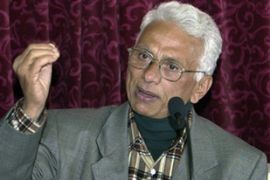Maoists join Nepal parliament
Maoist rebels form second-largest group in the new 330-member interim government.

The constitution, prepared by the ruling seven-party alliance and the rebels, was approved by the sitting house of representatives, which after passing the new interim constitution disolved itself.
A new interim legislature, in which the Maoists are the second-biggest group, was then set up in what perhaps has been the most significant step towards cementing a lasting peace since the rebels put down their guns in April.
Peace deal
Khim Lal Devkota, senior Maoist leader, said:” This is the achievement of 10 years of people’s war waged by the Nepali people.”
“We think the new interim legislature will give a new direction for the creation of a new Nepal,” said Devkota, one of the nominees of the [Maoist] Communist party of Nepal to the proposed 330-member interim legislature.
|
“Now they will have to learn the politics of compromise” -Kunda Dixit,
editor of the Nepali Times Weekly
|
The Maoists began fighting the monarchy in 1996, but declared a ceasefire last year after mass street demonstrations forced King Gyanendra to give up direct rule.
In November, the multiparty government and fighters struck a peace deal declaring an end to the conflict in which more than 13,000 people died in the Himalayan kingdom.
Under the pact they agreed to lock up their weapons under UN supervision in return for a promise by Girija Prasad Koirala, the Nepali prime minister, to name them in an interim government.
The administration is meant to oversee elections for an assembly tasked with preparing a new constitution and deciding the future of the monarchy, which the Maoists want abolished.
No more threats
Analysts said the deal showed the Maoists intended to join the mainstream.
Kunda Dixit, the editor of the Nepali Times weekly, said: “Now they will have to learn the politics of compromise.
“Their biggest challenge will be that they can’t use the threat of violence to get their way in the parliament.”
The interim parliament will comprise of 209 present members and the Maoists with 38 seats to be shared by constituents of the ruling alliance.
Critics say the draft interim constitution gives unlimited power to the prime minister, including the right to appoint the chief justice of the supreme court and has no provision for legislative control over the executive.
“It goes against the fundamental principles of the separation of power as both judiciary and legislature would be under the control of the government,” said Yubaraj Ghimire, editor of the Samay magazine.
The Maoists, who have vowed not to return to war, were also set to start storing their arms in metal containers under UN supervision on Tuesday, but keep the keys as part of the deal.
The United Nations wants the security council to authorise up to 186 monitors to help enforce the peace pact.
It is also sending officials to help with the election for the constituent assembly.